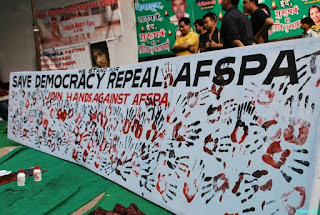The
Armed Forces (Special Powers) Act of
1958 is the act that gives the armed forces of India the special powers to
function in areas termed as ‘disturbed’ by the Governor of the state or the
Central government. The act was formed in 1958 for the first time to include
the North-Eastern states of India, also known as the seven sisters.
It was amended in 1983 to include the states
of Punjab and Chandigarh in the act, which was later revoked in 1997, after 14
years of its application. In 1990, it was applied to the state of Jammu and
Kashmir. This act has come under heavy criticism in many places because of the
possible violations of human rights which act in some cases in these disturbed
areas.
Click here to read: Lecturette Series- Rise in onion prices making us cry!!!
Also read: SSB Lecturette Series: Indo Bangladesh Land boundary agreement
Read: SSB Awareness series: A scandal of Diesel engine
Read: SSB Awareness series: A scandal of Diesel engine
AFSPA
was passed in 1958 with the increasing demand
of the Nagas for a separate nation of Nagaland. They went to the extent of
boycotting the elections and public governmental bodies. Due to the tense
situation, the government intensified the police forces and their action
towards this revolt. But in the wake of the police being unable to contain the
rebellion by the Nagas, the Naga Nationalist Council formed a parallel
government called the “federal government of Nagaland”. Under the provisions of
the act, Assam Rifles were deployed in the region to contain this. This was
further extended to all the states of North-East India owing to the increasing
terrorist and insurgency activities in this region. In 2015, the AFSPA for
these regions got extended by another year to completely ensure the end of
insurgency operations in the area.
AFSPA
was introduced in Punjab and Chandigarh in the year 1983 with the amendments which gave the armed forces the
special powers to stop any vehicle to
search if it were under the eye of suspicion of the forces. Secondly, it gave
the armed forces personnel the power to break
any lock to which they did not have access to in the disturbed areas. It
was again amended in 1990 where Jammu and Kashmir was brought under the purview
of the act. This amendment gave the armed forces the right to fire upon a person violating orders after due warning
in a disturbed area, enter any premise under the suspicion of terrorist
activities there, destroy any suspected hideouts or arms buildings and arrest any person without a warrant or
questioning. The ethically problematic part is the fact that the armed force
officers are not accountable for their actions to the people of this area as
they would be working under the power of this act. Through the second
amendment, the central government also started having the right to classify an
area as disturbed, and there is no scope for legal justification as to why a
place is classified as disturbed.
Click here to read: SSB Lecturette Series - NOTA is good or bad?
Also read: SSB Lecturette Series - All you need to know about NITI Aaayog
The
afore-mentioned salient points does make any person question the act and how it
is a violation of human rights in multiple ways. Moreover, it gives the
government and the armed forces supreme power in these disturbed areas and
above the rule of law in some sense. This is evident in the findings of the
high profile Santosh Hegde Commission under the past Supreme Court judge, Santosh
Hegde, which stated that out of all the people killed by the armed forces in
Manipur, most of them were innocent. This is probably the reason that the
social activist Irom Sharmila, also
called the ‘Iron Lady of Manipur’, has been on a hunger strike since 14
years for the repeal of this act. The United Nations have questioned our
government’s stand on AFSPA currently and many organisations and NGO’s have
termed it as medieval and draconian.
Now, this act according to me is not correct
as every person should be accountable for their actions at some point of time
or the other. If this doesn’t happen, then our constitution fails itself. But
is the act totally illogical? Are all the powers of this act been abused by the
armed forces? The truth is that we cannot say that the powers given by this act
have been abused by the forces. These issues have arose due to suspicious
activities in these areas already infested with terrorism and insurgency. The
grant of some of the powers to the armed forces is totally logical in a region
which is in a situation of being tangled with terrorism. But in my opinion,
there should be a check on this by a
sense of accountability of both the government and the forces that should
be brought in for the activities or operations that the armed forces conduct in
these areas. This would help the act to fulfil its intent of being an act to
safeguard national security as it was meant to be in the first place, rather
than being a violating and oppressive law.
About the Author :
Albin
Jose did his schooling from Noida and completed his B.Tech from IIT Madras
and currently working with an education based-firm in Mumbai. In free time,
he like to read and go on treks in and around Mumbai. Through his articles he
want to spread awareness among the aspirants.
|



No comments:
Post a Comment